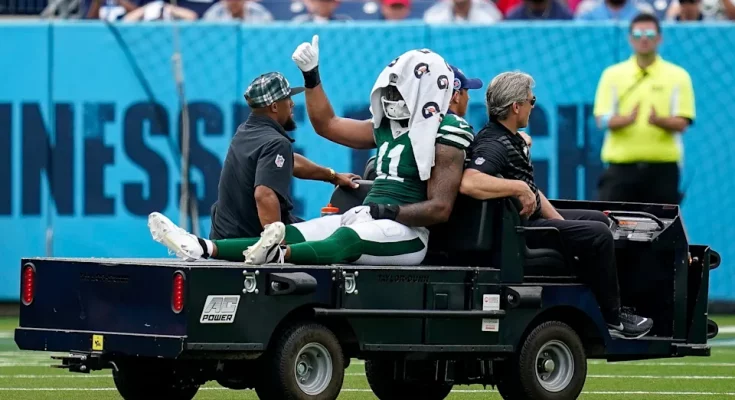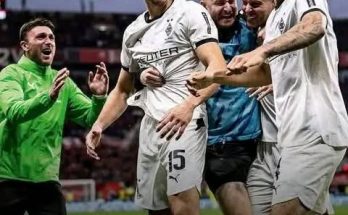The ongoing saga surrounding Jermaine Johnson’s recovery from his torn Achilles has been a focal point for the New York Jets and their new head coach, Aaron Glenn. The narrative has been one of cautious optimism, a delicate balance between the player’s personal drive to return to the field and the organization’s long-term vision for their key pass rusher. This situation underscores the complexities of high-stakes professional sports, where individual health, team performance, and contractual obligations intersect.
Johnson, who emerged as a Pro Bowl talent prior to his devastating Week 2 Achilles tear in the 2024 season, has been diligently working his way back. His injury was a significant blow to a Jets defense that relies heavily on its pass rush to disrupt opposing offenses. The immediate aftermath of such an injury is always a period of uncertainty, not just for the player’s immediate return, but for his long-term ability to recapture his previous form. An Achilles tear is notoriously challenging, often requiring extensive rehabilitation and a gradual return to high-intensity activities. Johnson himself shared his journey on social media, expressing the immense physical, mental, and emotional hurdles he faced over the past 10-11 months. His announcement that he had been “cleared” by his personal doctors on Friday, July 25, 2025, was met with a collective sigh of relief and excitement from the fanbase.
However, head coach Aaron Glenn’s approach to Johnson’s return has been measured and pragmatic. While Johnson’s personal clearance is a vital step, Glenn has consistently emphasized that the team will not rush their star into action. This sentiment was evident when Johnson was initially placed on the Active/Physically Unable to Perform (PUP) list at the start of training camp. This designation, as explained by Jets senior reporter Eric Allen, allows Johnson to attend meetings and use team facilities but prevents him from practicing until he is fully cleared by the Jets’ own medical staff. It provides the team with the flexibility to dictate the pace of his return, ensuring that all necessary protocols are followed.
Glenn’s philosophy is rooted in prioritizing the player’s longevity over immediate gratification. He has repeatedly stated that his concern extends beyond Week 1 or Week 2; he wants Johnson to be ready for the “long haul.” This is a testament to Glenn’s player-first mentality and a recognition of Johnson’s importance to the franchise’s future. The Jets picked up Johnson’s fifth-year option this offseason, a significant financial commitment that further solidifies his role as a cornerstone of their defense. This decision, made even while Johnson was rehabbing a major injury, speaks volumes about the team’s belief in his talent and potential.
The recovery process for an Achilles tear is not just about physical healing; it’s also about rebuilding confidence and trust in the injured limb. Johnson has been seen pulling weighted sleds and engaging in other rehab activities on a side field during minicamp and the initial days of training camp, a clear indication of his commitment to the process. He has openly discussed the mental challenges, including the feeling of letting his teammates down when he went down with the injury. This emotional aspect of recovery is often overlooked but is crucial for a player’s complete return. Johnson’s resilience and determination in overcoming these hurdles are integral to his expected success.
Interestingly, Johnson has found a source of support and guidance in a familiar face: Aaron Rodgers, his former Jets teammate who now plays for the Pittsburgh Steelers. Rodgers himself suffered an Achilles tear in Week 1 of the 2023 season, providing a unique perspective and shared experience. Johnson recounted Rodgers’ encouraging words after his own injury, with the veteran quarterback telling him he had a “10-year-plus career” ahead of him and to “chalk it up, calm down a little bit, take it on the chin, handle it.” This connection highlights the fraternity within professional sports and the invaluable role that shared experiences can play in a player’s recovery journey. The irony of Johnson’s potential return in Week 1 against Rodgers and the Steelers adds another layer of intrigue to the upcoming season opener. Johnson has expressed excitement for the matchup, acknowledging the emotional significance of his first game back, but also emphasizing that “when I get inside those lines, there’s no friends.”
The Jets’ defensive scheme under Aaron Glenn will undoubtedly benefit from Johnson’s return. Prior to his injury, Johnson had established himself as one of the league’s more well-rounded edge rushers. His 2023 Pro Bowl campaign showcased his versatility, with impressive statistics including 7.5 sacks, 16 quarterback hits, 11 tackles for loss, 55 total tackles, 56 pressures, 20 run stops, a pick-six, a forced fumble, and a fumble recovery. His ability to both pressure the passer and defend against the run makes him an invaluable asset. Glenn, who coached Johnson at the 2022 Senior Bowl, has consistently praised his “hard-nosed, physical, violent” style of play, coupled with his athleticism and ability to win off the edge.
While the expectation is that Johnson will be ready for the regular season opener against the Steelers, as Glenn has consistently conveyed optimism, the ultimate decision rests with the Jets’ medical staff. The team is not operating on an arbitrary timeline; rather, they are focused on ensuring Johnson is fully prepared for the rigors of an entire NFL season. This patient approach, while perhaps frustrating for eager fans, is ultimately in the best interest of both the player and the team. The Jets’ defense has the potential to be truly elite with a healthy Johnson anchoring the edge, and ensuring his long-term health is paramount to sustaining that level of play. The anticipation for his return is palpable, and when he finally steps back onto the field, it will signify not only a personal triumph but also a significant boost for a team with high aspirations. The disciplined approach adopted by Aaron Glenn reflects a strategic understanding of player management, where the present performance is meticulously balanced against the enduring value of a key asset like Jermaine Johnson. This ongoing process, marked by both the player’s remarkable dedication and the coaching staff’s measured caution, continues to be a defining storyline as the NFL season approaches.



